Table of Contents
1. Meeting at the Embassy
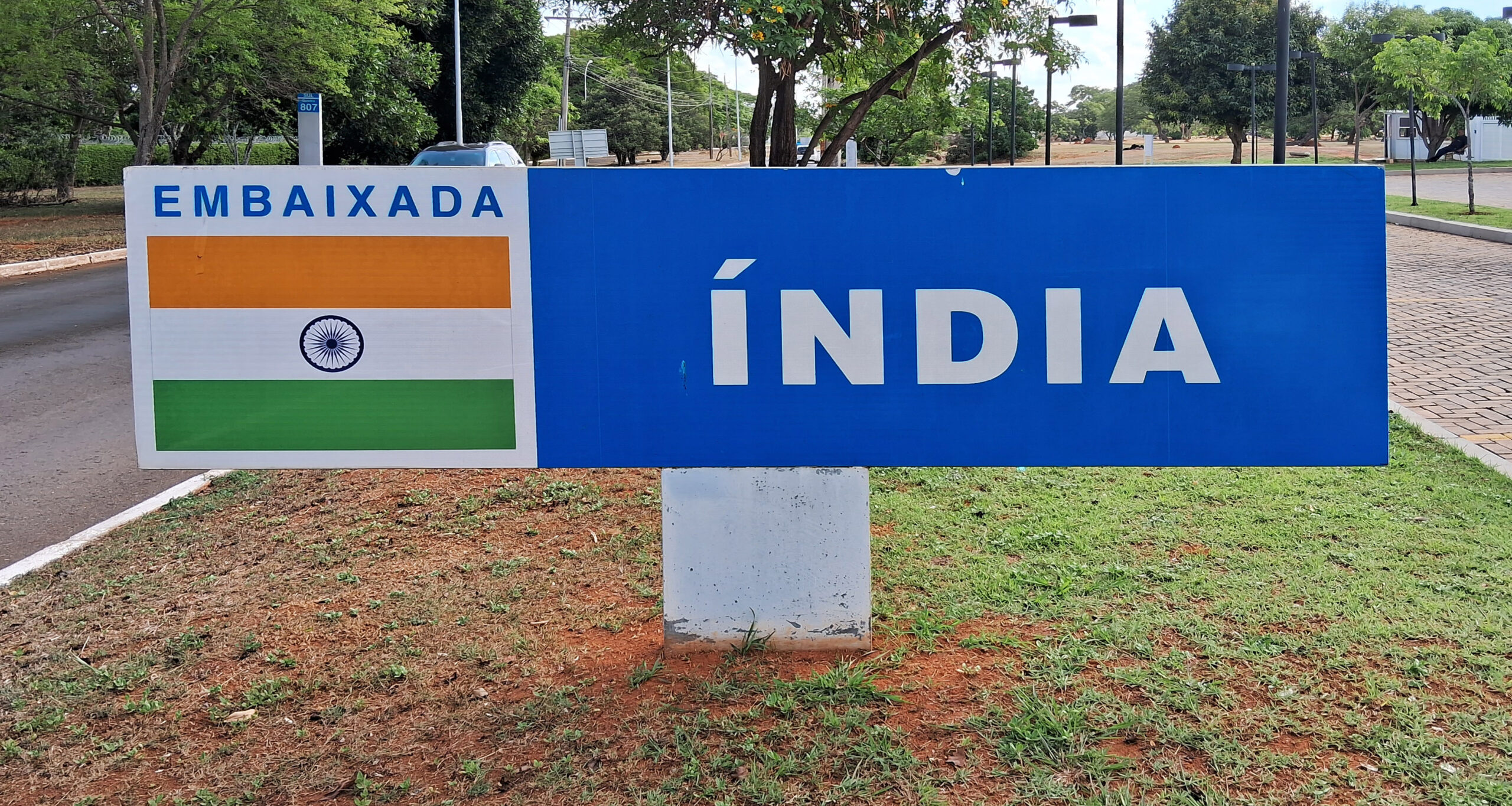
Road sign of the Embassy of India, in the sector of embassies of Brasilia
On 23/10/2023 at 4pm, we were lucky enough and honoured to meet H.E. the Deputy Ambassador of India in Brasilia, Mr B.C. Pradhan, during a meeting that lasted 1 hour and 45 minutes, at the Embassy of India in Brasilia.
He had rightly accepted our proposal for a meeting, and he had even done it quickly (less than 12 hours after we sent it to him).
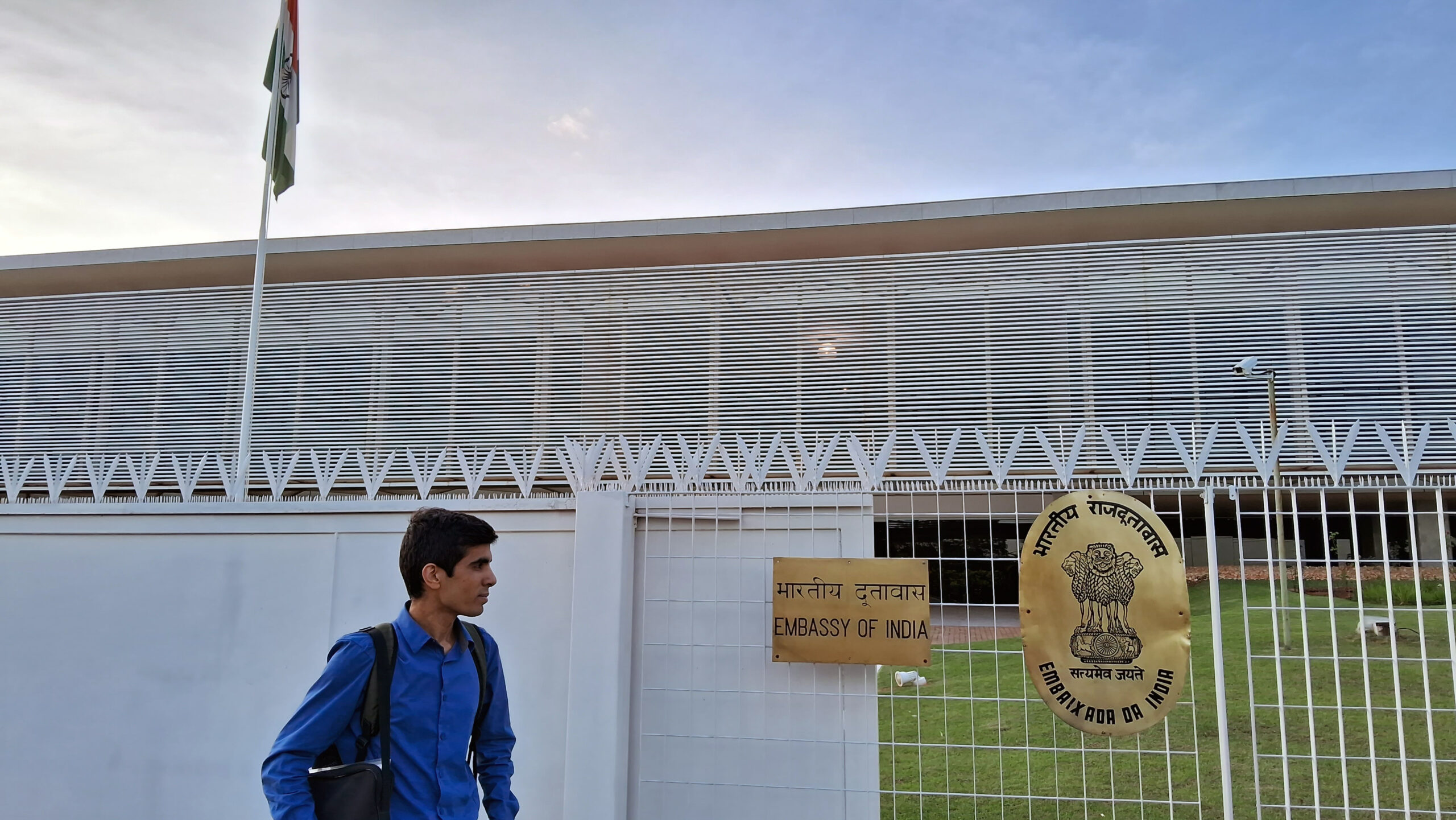
Entrance of the Embassy of India in Brasilia
At first, the meeting was a little difficult for us because it was a bit intimidating, but with verbal and on-site dialogue, we can always manage to ‘break the ice’ and create a real connection.
So, little by little, the discussion became more precise, more sympathetic and more useful.
India is a very important country, not only because it is on the way to becoming the most populous in the world, but also because India has a culture of firm but non-violent resistance (Mahatma Gandhi, Jawaharlal Nehru…), and of tolerance and openness, as this meeting was an example of.
This country is also dear to the hearts of people who were lucky enough to discover their “mild” autism thanks to the Indian movie “My Name is Khan“.
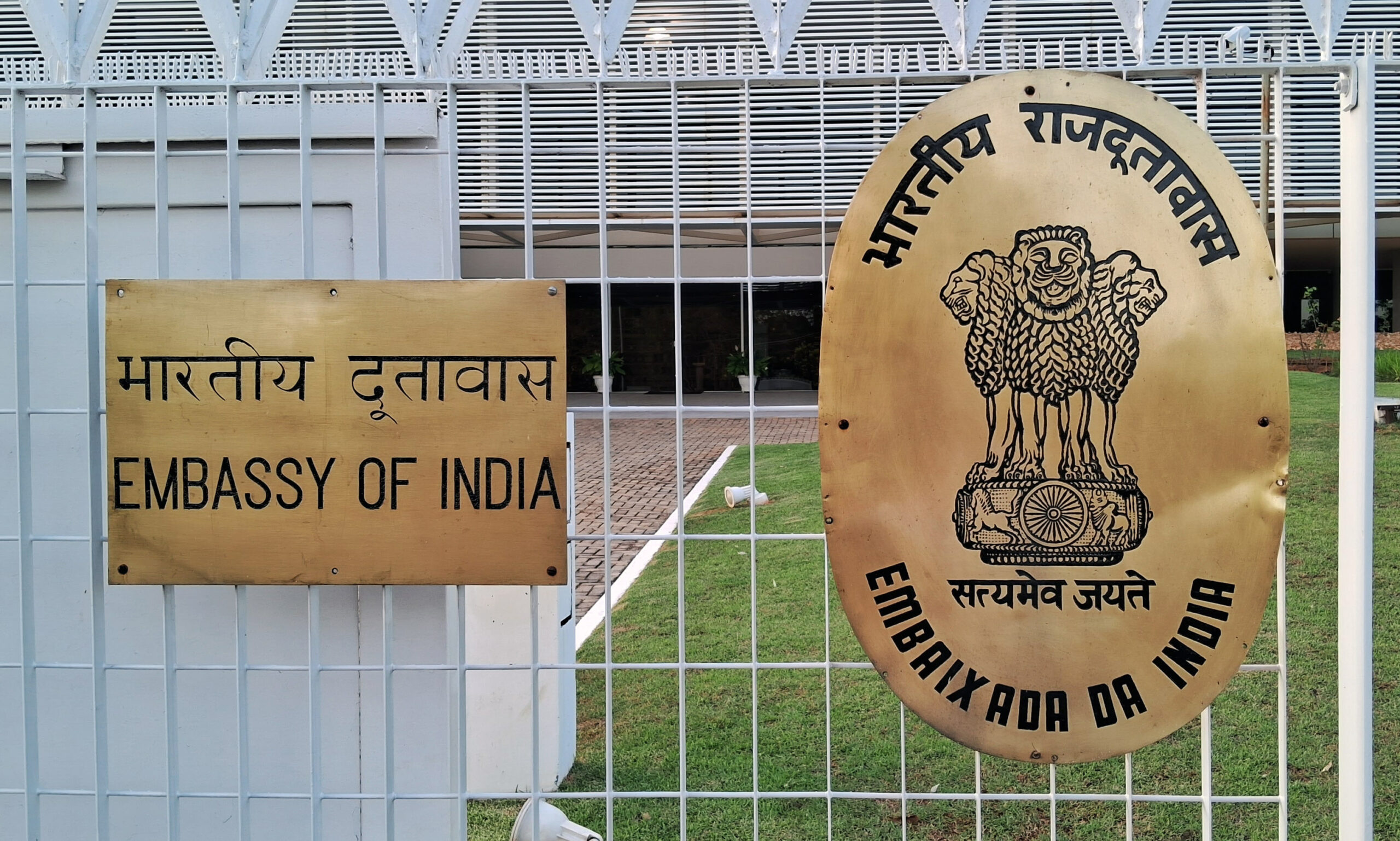
Plaques of the Embassy of India in Brasilia
Among other things, Mr B.C. Pradhan offered to facilitate communication with the relevant authorities in India, which was the main aim of our initiative.
Indeed, when we contact the authorities in various countries from Brazil, and as an organisation of autistic people, it seems that in general they really do not pay attention, probably because it must seem to them something “from another world”.
That is why we need to be able to talk orally and face-to-face, and that is exactly what embassies are made for.
At the end of the meeting, we very much appreciated the efforts of the Deputy Ambassador for improving the photo-taking, by changing location several times and repeating the photo-shootings not less than 19 times, something we would not have dared to ask for, but which corresponded perfectly to our wishes.
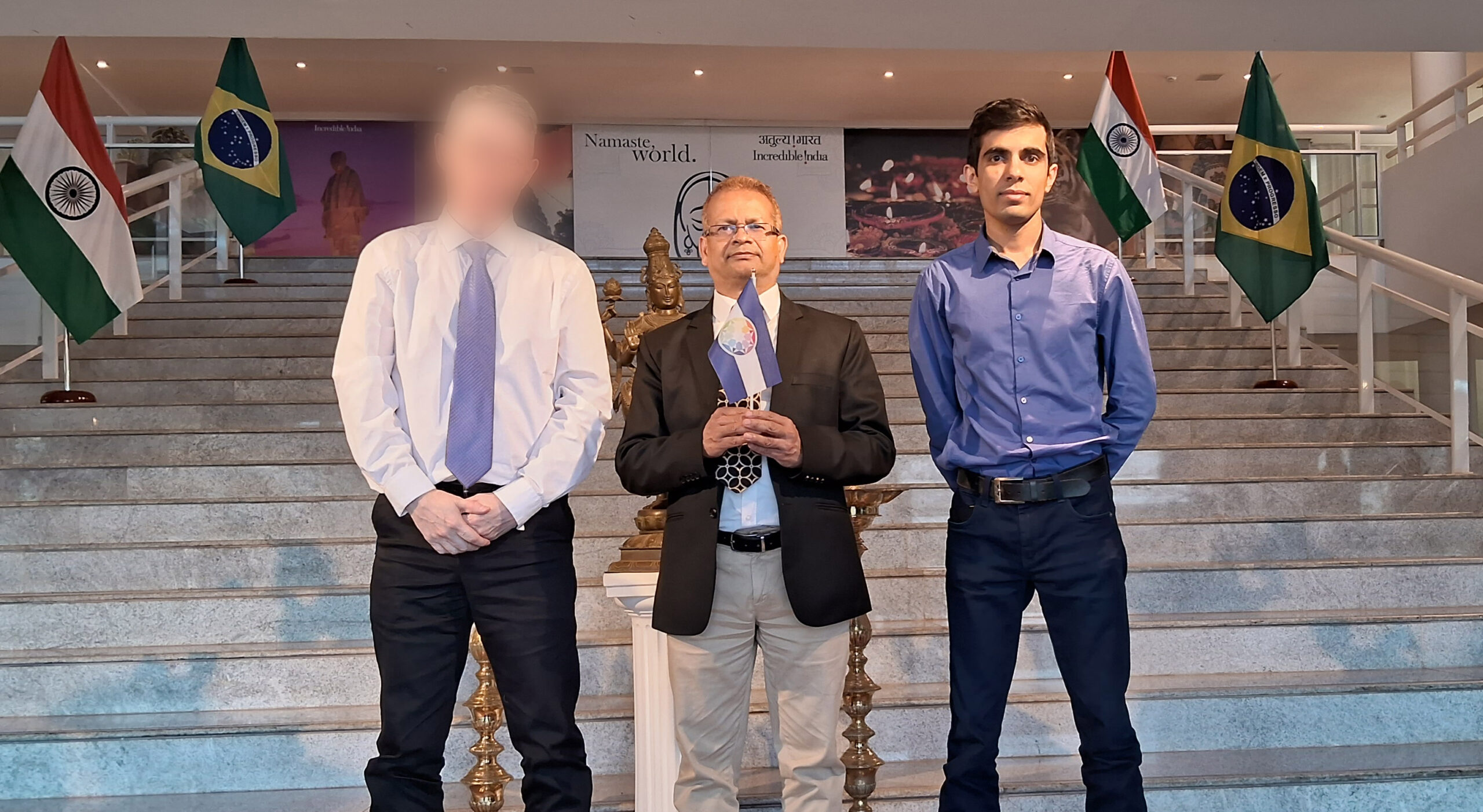
His Excellency the Deputy Ambassador of India in Brasilia, holding the Flag of Autistan in the Embassy of India. (On the left, the founder of the Autistan Diplomatic Organization (who does not wish to be publicly exposed), and on the right, his assistant.)
It is only a first contact, but it is very encouraging.
It shows that some serious people are taking us seriously, by making the effort to talk to us, which enables them to check whether what we are saying is realistic or not.
We wrote up a short report on the meeting, and Mr B.C. Pradhan wrote to us to say that he found it “really fascinating”.
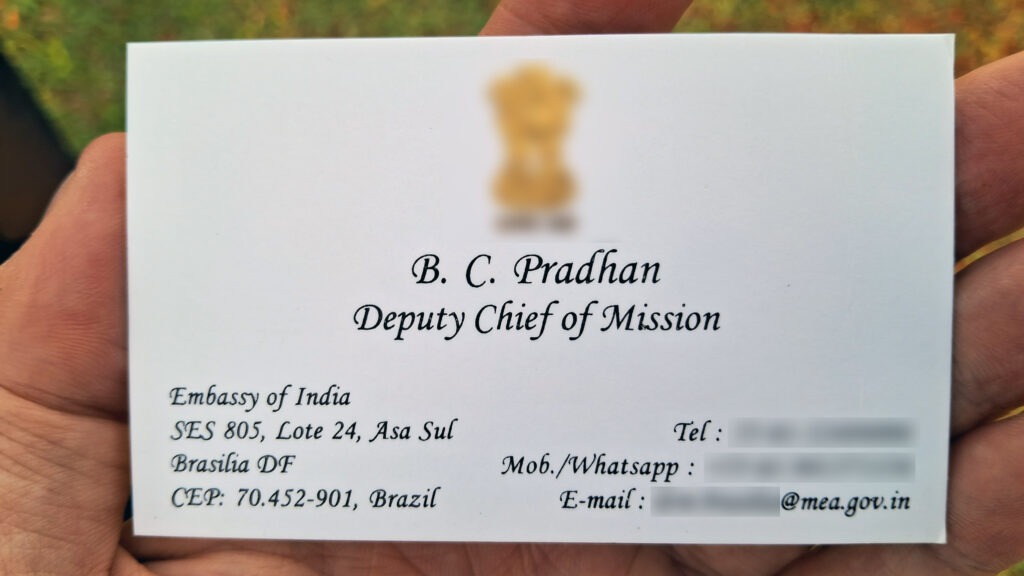
Visiting card of H.E. the Deputy Ambassador. (The emblem of India is blurred here, to avoid facilitating the projects of possible counterfeiters).
Note: Before this meeting, we have printed out, we have read and annotated the various official texts (laws and others) concerning disability and autism in India.
There is a lot to be said about this, and we will come back to it later, once we have established a connection with the authorities in the capital of India.
In the meantime, we will be posting links to these texts in the section “Autism in India” (currently under construction).
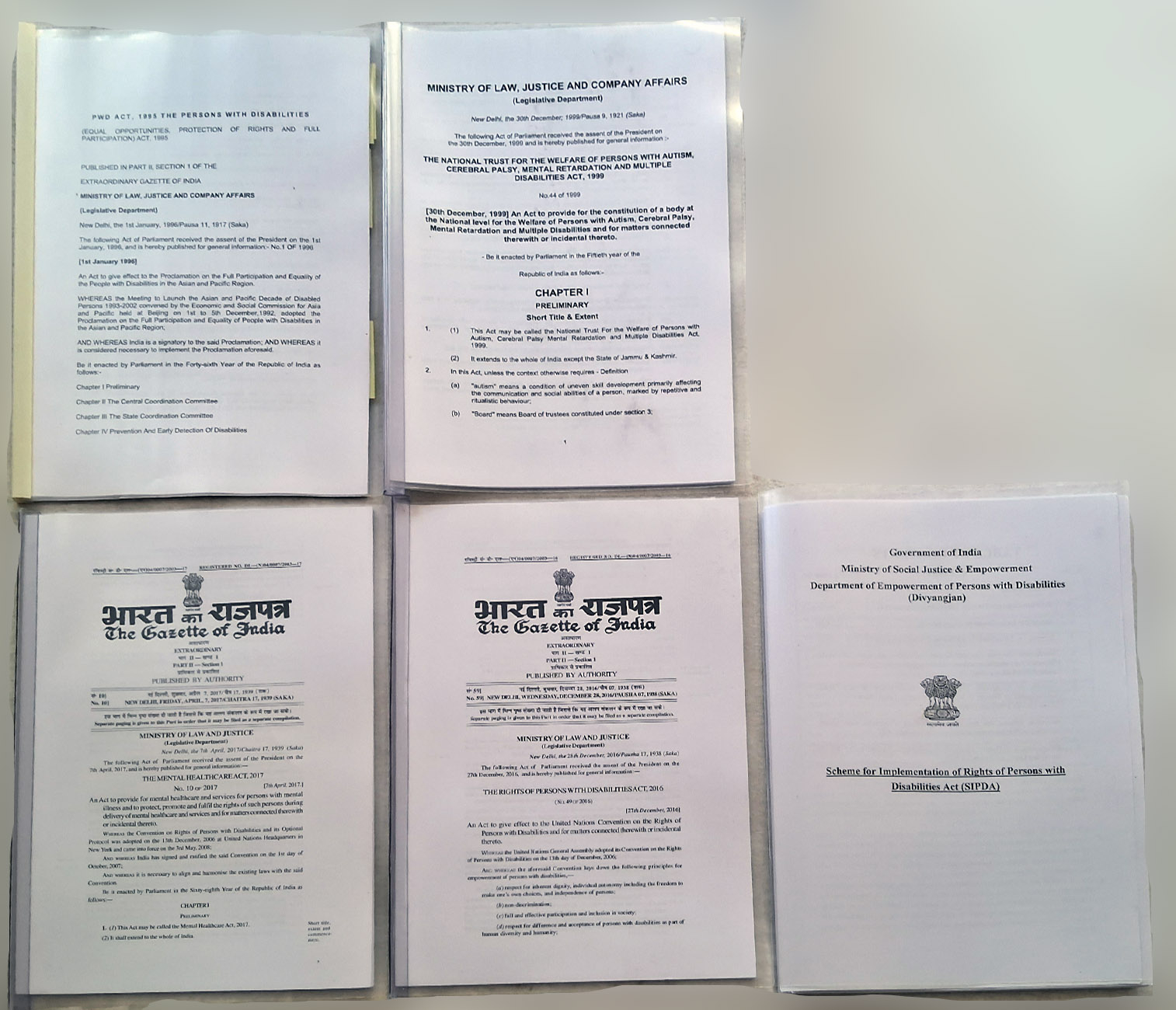
2. Our report about the meeting
Here is our text:
On 23/10/2023, we had the honor and the luck of being received by Mr. B.C. Pradhan, Vice-Ambassador of India to Brazil.
He has been very kind, considerate, available, patient, open and attentive.
The main points of the meeting:
A- On the part of our Organization
A1- First of all, it is essential to understand the difference between “autism” and “the troubles or disorders characterizing autism”, without which it is difficult or impossible to talk about autism without getting lost in absurd confusions and paradoxes, which unfortunately is what happens almost all the time.
A2- The crucial importance of the notion of accessibility for autistic people, unfortunately misunderstood or ignored.
A3- The notion of what we call “socio-generated harmful hits (or disturbances)” (sensory, mental or other).
A4- The fact that autism can be compared, in our view, to a kind of self-protection of natural harmony, and the central importance of the notion of harmony and coherence in understanding autism and in reducing those harmful hits and hence the suffering.
A5- The quote by the Indian philosopher Jiddu Krishnamurti, which could almost sum up our approach: “It is no measure of [good mental] health to be [well] adjusted to a profoundly sick society“.
A6- The qualities of autism (and some examples of achievements in our Embassy).
A7- The things that need to be done to ensure accessibility for autistic people are not extravagant, and do not harm non-autistic people: on the contrary, they benefit them, starting with the most vulnerable, such as the elderly.
It is simply a matter of correcting the errors, excesses and absurdities of the “normal system”, which are detrimental to everyone.
A8- When they simply “silence” autistic people (for example, in the event of crises, which are inevitable given the lack of accessibility and therefore the omnipresence of the “harmful hits (or disturbances)”), without seeking to understand the underlying causes, this is like turning off the lights or sirens of an alarm system without investigating the underlying source.
Indeed, we (the autistic people) are very, very sensitive to problems and errors and absurdities etc., so we are like “revelators” or early warning systems useful for society to correct itself, and we see alas every day a little more how necessary this is (destruction and evil getting worse and worse, created by a “lost system”).
A9- It is essential not to address “autism” with a “defectological approach”, but without denying the existence of “troubles” (cf. fundamental distinction to be made between the two, see A1).
Examples with anecdotes from Kazakhstan, in particular the dazzling success with young Tima (video evidence on Autistan.kz).
A10- If we had to keep just one word when it comes to autism, it would be “try” or “experiment” (as many different and new things as possible).
And that is precisely what Mr Pradhan did with us, which is very much appreciated, given that autism and our project do not really fall into the remit of his Embassy.
On the other hand, it has to be understood that anyway there is nothing planned for autistic people (apart from defectological and “formatting” things) in a society “planned by itself for itself”, there is no space, no possibilities, so we have to try various things, more or less at random, we have to knock on all sorts of doors, in order to try and advance the positive approach to autism, which is absolutely necessary.
A11- It is possible for our Organization to provide really useful information, even without necessarily being administratively registered in such and such a country (with supporting examples, such as the letter from Mr. Shekhar Saxena, then WHO Director of Mental Health – who is also an Indian, by the way).
A12- The main aim of our Organization is to dialogue with public authorities in countries, to offer them information to help them better understand autism, and thus reduce misunderstandings and confusion, which in turn helps to improve public policies.
A13- We can also help reduce conflicts with the local or national associations.
A14- Through face-to-face exchanges here in Brasilia, embassies can help initiate connections with the public authorities in their countries concerned with autism.
Indeed, when we contact them ourselves from afar, they very rarely respond because it is probably too abstract / distant / unusual for them (in other words, the “human link” is missing).
A15- For a country as large as India, the relevance of the idea of a special service to use the analyses of highly gifted people (including some autistic people) to solve really serious and delicate problems. With 1 billion inhabitants, it must be possible to find enough “super-brains”.
B- The main points of the Deputy Ambassador
B1- He advises us to contact CEBRI, an international relations think tank, in the perspective of the G20, whose presidency will be held by Brazil, and which starts soon.
CEBRI is actually based in Rio de Janeiro.
It sounds like a really useful piece of advice, and we are going to do our best to approach this organization and try to convince it of the relevance of our information and, if possible, of our participation.
It is a good example of how useful it is to talk to embassies, because without that, we would not have come up with this idea.
(Edit of 10/12/2023 : CEBRI seems to be rather economically oriented, and we looked at all their publications, but they only contained the word ‘social’ once, and only in the title.
On the other hand, that advice did enable us to learn about the C20 concept, which is not about ‘Think tanks’ (T20) but about Civil society, including the question of minorities and disability.
So we are trying to get responses from various people and organisations to try and participate.)
B2- He proposes to facilitate contact with the relevant public institutions in India if we visit the country, which seems impossible at the moment due to lack of resources, but we assume that this provision may also be useful when attempting dialogue from afar.
B3- In discussions relating to natural and spiritual and calming things, we mentioned the “Gayatri mantra“, and he spoke of various things including in particular “Iskand”(?) (to investigate).
B4- Having listened with interest to the explanations of Eric L. about the Indian film “My name is Khan” (which he knows, which helps a lot), about the tremendous revelation (of autism) made possible by this film, and about the attempts to leave a note for the actor Sha Rukh Khan during a visit to Mumbai, Mr. Pradhan very kindly offers to intervene so that we can meet him during a visit to India. This very interesting proposal could probably be used for a letter (with a reply). To be explored.
B5- Finally, in view of our difficulties in getting an appointment with the National Secretariat for the Rights of Disabled People of Brazil, and given the date of our first letter to them (22 days earlier), he suggests sending them a respectful reminder.
We took the opportunity to point out the problems of incommunicability with easily offended administrations, particularly in France, which leads to important considerations on the notion of humility and “putting egos in the background”, qualities very present in Brazil, but also in India, clearly.
(Speaking of humility, Mr Pradhan even went so far as to thank us in writing “for having used our precious time” for him, when in fact it was quite the opposite!
A fine lesson in diplomacy, to be remembered).
B6- He concludes by saying how much he enjoyed the discussion, and for having learned new things.
C- Conclusion
Mr. B.C. Pradhan listened attentively and he took all the time necessary (two things that are really essential to be accessible to autistic people).
3. Message of the Deputy Ambassador, who found our report “really fascinating”
Date: mer. 25 oct. 2023 à 19:22
Subject: Re: Summary report of our meeting of 23/10/2023
To: <contact@autistan.org>
Cc: Suresh K. Reddy <***@mea.gov.in>
Deputy Chief of Mission
Embassy of India, Brasilia
SES 805, Lote 24, Asa sul
Brasilia DF
CEP: 70.452-901, BRAZIL
Tel: +55 61 98157****
